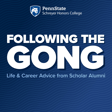
FTG 0031 – What is a Dean? A Homecoming Chat with Honors College Dean & Materials Scientist Patrick T. Mather ’89
Overview:
Dr. Patrick T. Mather ’89, ’90g Engineering is the fourth Dean of the Schreyer Honors College. Dean Mather returned to Dear Old State after a career that was launched with the US Air Force Research Lab and several stops with increasing responsibility in academia including the University of Connecticut, Case Western Reserve University, Syracuse University, and most recently Bucknell University, where he served as the Dean of Engineering. He earned his B.S. with honors and M.S. degrees from Penn State in Engineering Science and Engineering Mechanics, respectively, following which he went on to receive his Ph.D. in Materials at U.C. Santa Barbara in 1994. “Dean Pat” joined Following the Gong to share his career story and life & career advice for Scholars from his unique perspectives as both an alum and as Dean – including lessons in materials science, the thesis, liquid crystals, academia, and leadership. He also shares his musical talents in this episode recorded live in Atherton Hall’s famed Grandfather Clock Lounge. You can read Dean Pat’s full bio and a more detailed breakdown of the episode topics below.
Guest Bio:
Dr. Patrick T. Mather currently serves as the fourth Dean of the Schreyer Honors College at Penn State. Dean Mather earned his B.S. with honors (’89) and M.S. (‘90) degrees from Penn State in Engineering Science and Engineering Mechanics, respectively, following which he went on to receive his Ph.D. in Materials at U.C. Santa Barbara in 1994 with dissertation research focused on the rheology of liquid crystals. Following work as materials research engineer for Air Force Research Lab, Mather’s academic career has included University of Connecticut, Case Western Reserve University, and Syracuse University, where he helped to create and serve as director of the Syracuse Biomaterials Institute, a sustainable, interdisciplinary effort with 20+ faculty spanning three institutions and seven departments. From 2016 to 2021, Pat served as Dean of Engineering at Bucknell University, where he enjoyed the opportunities and challenges of academic leadership, with a particular focus on inclusive excellence. In 2021 returned to his academic roots at Penn State to become the dean of Schreyer Honors College and professor of Chemical Engineering. Mather’s research interests center around smart materials, including shape memory polymers, self-healing materials, polymeric nanocomposites, and biodegradable polymers for medical devices. He is the author of over 160 peer-reviewed papers, inventor on more than 40 patents, and Fellow of both SPE (Society of Plastics Engineering) and the AIMBE (American Institute for Medical and Biological Engineering). Pat is the Editor-in-Chief for Polymer Reviews. He has won several student-nominated teaching awards and prides himself on innovative and engaging teaching methods. Pat and his wife Tara Mather enjoy spending time with their blended family of five grown children (and too many cats to count). You can often catch Tara and Pat out on the road distance running or tandem cycling.
Episode Specifics:
In this episode, Dean Mather shares his insights on:
· Choosing a pragmatic major when you are “not an academic” in high school
· Leveraging general education courses (“electives”) to engage in interests outside your major
· Finding res
· Research opportunities in your passion area – and why epoxy is important for aircraft, and not just crafts!
· Thoughts on the honors thesis process as both alum and Dean
· Pursuing passions outside your major – like playing in a band as an engineering student
· What it’s like to stay an extra year to complete a master’s degree at University Park
· Perspectives on the unique opportunities of graduate education

